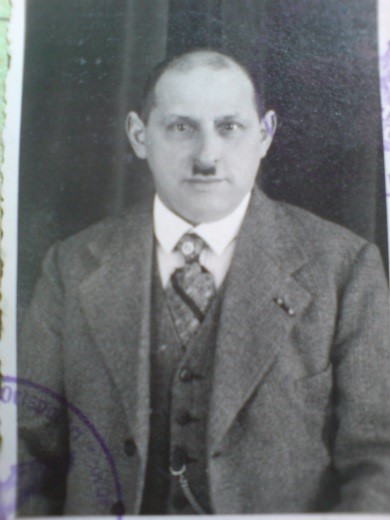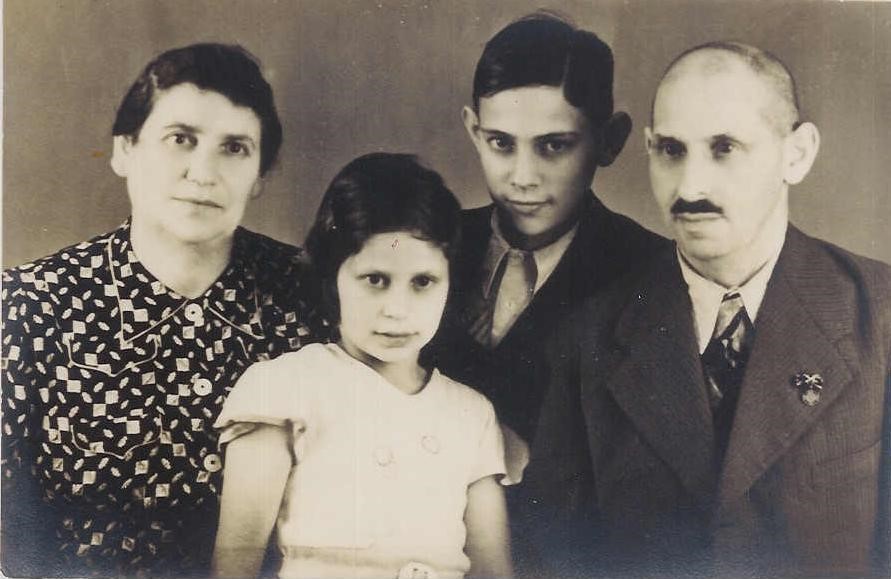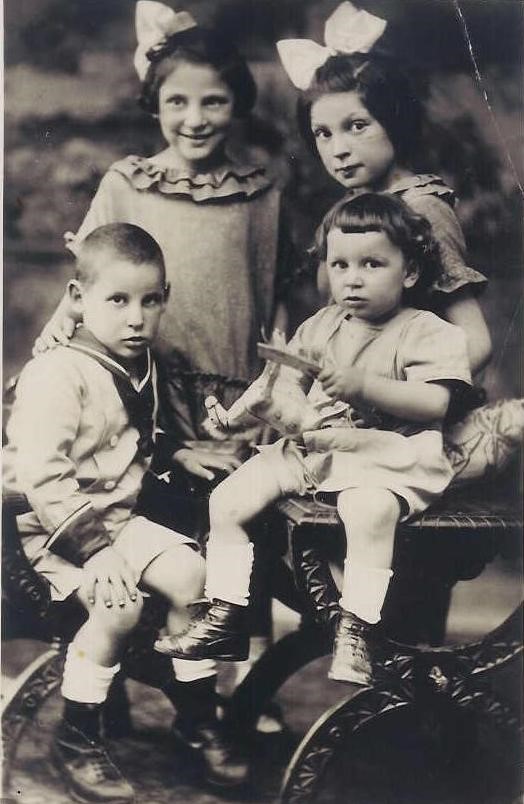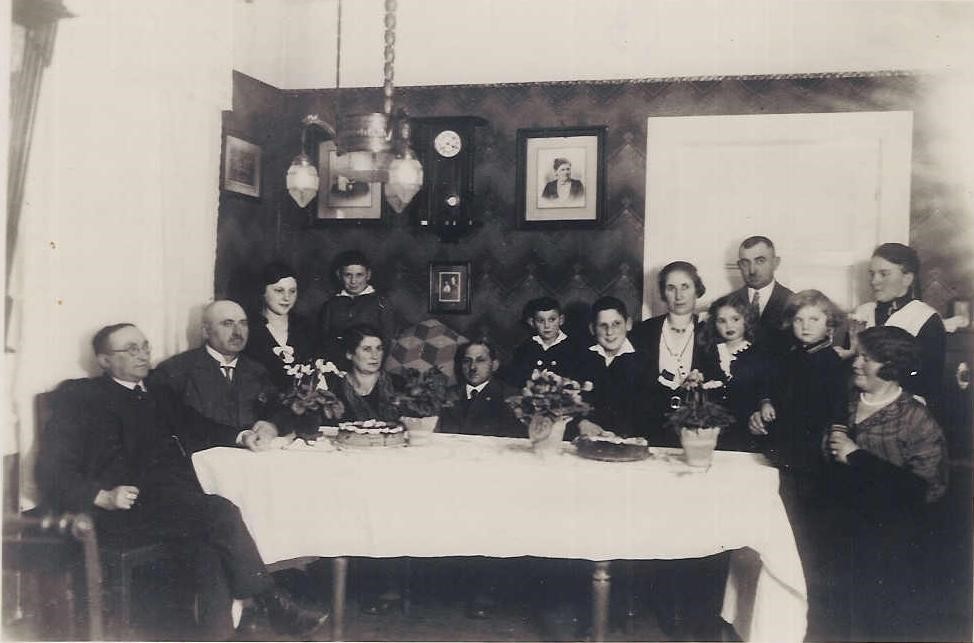
Theobald Götz, born May 19, 1880 in Schleusingen, ran a livestock trade at Brauhausgasse 1 with his wife Sara Götz, née Zeilberger, born March 18, 1890 in Ermershausen. She moved on 16 July 1913 from Ermershausen to Schleusingen.
Theobald Götz is a direct descendant of one of the first Jewish families in Schleusingen.

Photo: Theobald Götz (Collection: Family Götz)

Photo: Theobald Götz with his wife Sara and their youngest children Siglinde and Herbert, around 1940 (Collection: Family Götz)
Theobald Götz had the largest livestock trade and several plots of land as well as a residential house with a side estate in Schleusingen. In 1938 the authorities withdrew his cattle trade permit and "forced" his business. After he was arrested on November 9, 1938 like all Jewish men in Schleusingen and imprisoned in the Buchenwald concentration camp, he returned to Schleusingen on December 10, 1938 to his wife and his two youngest children Herbert and Siglinde. The family had already sent the three older children abroad, his son Gustav was still in Dachau concentration camp. The non-Jewish friend of Theobald Götz, the mayor of Breitenbach, Oskar Müller, is said to have tried to persuade him to leave the country after he had hinted at the Buchenwald concentration camp. The head of the Jewish community of Schleusingen, Theobald Götz, had replied that he had been born here, that he would stay here, and that he would also die here.
On December 28th he had to sell his house plot with garden far below value to the big butchers Heinrich and Johanna Lusky. The sum insured for the house and the stables was 117,500 RM in 1934. When the property had to be sold to the cattle dealer Heinrich Lusky, the purchase contract stated RM 22,000 as the purchase price. In the end, the Luskys let the Götz family live in a part of their former flat for a rent of 60 Marks per month "to be paid in advance" until their transport on 9 May 1942. In this way, a big butcher not only eliminated a potential competitor, but also came into possession of a lucrative house and stable property at an extremely favourable price.
The city of Schleusingen was also the beneficiary of such processes, because not only the employment of forced laborers, but also "Aryanization" brought advantages. Thus, even before Theobald Götz returned from the Buchenwald concentration camp on 5 December 1938, the mayor of Schleusingen, Syré, stated at a city council meeting:
"In the liquidation of Jewish real estate, there is probably the opportunity to buy undeveloped land from the Jewish Theobald Götz at favourable prices."
The city councils passed the following resolution:
"There is an opinion that when the opportunity arises, the city should buy the land that is cheap and suitable for the city. The mayor is given power of attorney within this framework."
Syré replied:
"When the opportunity presents itself, I will acquire plots for the city if the purchase of these plots is expedient and the price can be addressed as particularly favourable."
Thus, on 6 May 1939, the city acquired land from Götz with a total size of 106.34 ha for 5650 Marks and leased it to inhabitants of Schleusingen and Hinternah.
It can be assumed that they are still in urban hands today, because the survivors of the Götz family did not obtain any compensation or restitution despite legal actions. All "Aryanizations" of Jewish property have always been approved with the knowledge and consent of the city.
The request by Theobald Götz, who on 23 March 1940 turned to the President of the Government to instruct the competent veterinary office to issue him with a certificate confirming his activity as a farmer and breeder for his forthcoming emigration, could have been dealt with as a formal act by any official without great effort. Under certain circumstances Götz would have been able to enter his profession more easily in another country, but his application was rejected.
On May 25, 1940, the remaining Götz family was reported:
"The emigration of the Jew Theobald Israel Götz with his family to Shanghai is nearing completion. A telegram sent to Shanghai a few days ago with a reply as to whether the entry permit had been granted has not yet been answered."
The Götz family probably did not get a positive answer. In addition, Götz, like all Jews in the German Reich, had to pay a special tax for each of his children who had already emigrated, which, however, was based on an estimate of the value of the property (real estate, land) and not on the actual sales value. The four oldest children of the Götz family had emigrated between 1937 and 1939. The passports of the parents Theobald and Sara and their two youngest children Siglinde and Herbert, issued on 19 January 1938, had already lost their validity on 18 January 1940, the date of the official notification of emigration. Two months before they were transported to the Lublin district, Theobald Götz fought for the transfer of the Jewish cemetery to the "Reichsvereinigung der Juden in Deutschland" (Reich Association of Jews in Germany) and applied to the Schleusingen District Court for the necessary change to be made to the land register. On March 7, 1942, Bucher, 1st Deputy Mayor, on behalf of Mayor Syré, turned to the District Administrator of the Schleusingen District on the grounds that the cemetery would "affect the planning concerns" of the city and cited the number of 11 Jews "whose emigration must be reckoned with one day". In a supportive reply, the District Administrator replied that the city "especially had to assert that, according to the general position of the state on the Jews, any [sic!] legal considerations [...] might be absurd from the outset". The ways and aims of Jewish policy, from which ultimately no Jew would be spared, were as well known in the Landratsamt as in the Stadtverwaltung.
Theobald and Sara Götz were taken together with their youngest children Herbert, born September 8, 1927 in Schleusingen, and Siglinde, born November 1, 1932 in Schleusingen, to the Weimar concentration camp on May 9, 1942, from where they were deported to the Belzyce ghetto near Lublin on May 10, 1942. They arrived there on 12 May 1942. Their traces end here.
Her son Gustav Götz, born on 10.12.1919 in Schleusingen, was arrested in November 1938 in the Buchenwald concentration camp and then transferred to Dachau. After his release at the beginning of May 1939, he emigrated to the USA on May 9, 1939 at the request of his father.
Her daughter Ilse Götz, born September 25, 1914 in Schleusingen, moved to Berlin on May 24, 1938. From there she emigrated to London/England. The daughter Lilly Götz, born on 7 October 1916 in Schleusingen, moved to Berlin on 11 August 1937 and emigrated to England in February 1939. From there she arrived one year later in the USA. The son Menachene (Meinhardt) Götz, born on 9 June 1923 in Schleusingen, moved to Frankfurt am Main on 26 April 1937, returned to Schleusingen on 30 August 1937, emigrated to Palestine on 6 March 1938 and from there to the USA.

Photo: Ilse, Lilly, Gustav and Meinhard (Collection: Götz family)

Photo: The Bar Mitzwa by Gustav Götz (Collection: Family Götz), c. 1934
Almost all family members and friends of the family were murdered in the Holocaust.
On the following page you can read excerpts from letters by Marvin Götz and his sister Lilli Stern.
Letters from Marvin and LilliOn the following page you can read the story about Dorn'sches house.
The Dorn'sches House No. 142